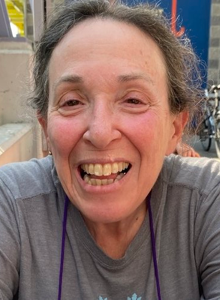 Curriculum Vitae (pdf)
Curriculum Vitae (pdf)
Background
I grew up in Cleveland Heights, Ohio. I received a B.A cum laude in 1972 from Case Western Reserve University, and a Ph.D. in Clinical Psychology from Southern Illinois University at Carbondale in 1977. I completed a predoctoral internship in Clinical Psychology at the Seattle Veteran’s Administration Medical Center.
I have served on the faculties of Southern Illinois University, the University of Washington, and the Washington School of Professional Psychology, and have taught and lectured through the U.S., Canada, Europe, Australia, Taiwan China, and Israel. In the early 1980s I hosted one of the first radio call-in shows by a psychologist.
Interests and accomplishments
Everything that I do is motivated by principles based in the Jewish teaching of “Tikkun Olam”, the Hebrew term for healing the world. The bulk of my scholarly work has been in the fields of feminist therapy theory, trauma treatment, lesbian and gay issues, assessment and diagnosis, ethics and standards of care in psychotherapy, and cultural responsivity.
I have authored or edited fifteen professional books including the award-winning Subversive Dialogues: Theory in Feminist Therapy as well as more than 150 other professional publications, and have been featured in six psychotherapy training videos.
A Fellow of ten American Psychological Association divisions, the Association for Psychological Science and the International Society for the Study of Trauma and Dissociation, I was awarded the Diplomate in Clinical Psychology in 1986 by the American Board of Professional Psychology and am a Distinguished Practitioner and Member of the National Academies of Practice in Psychology.
I have served on the editorial boards of numerous journals, and currently am a consulting editor for Psychotherapy: Theory, Research, Practice, Training, Trauma Psychology, Ethics and Behavior, and Journal of Trauma and Dissociation. I am Courtesy Clinical Professor in the Dept. of Psychiatry and Behavioral Sciences at the University of Washington.
I am a former President of APA Divisions 35 (Society for the Psychology of Women), 44 (Society for the Psychological Study of Sexual Orientation and Gender Diversity), and 56 (Trauma Psychology) and of the Washington State Psychological Association. I have also served as an elected member-at-large of the Executive Committee of Culture, Ethnicity and Race (Division 45 of the American Psychological Association).
I founded, and until June 2015, directed, the Fremont Community Therapy Project, a low-fee psychotherapy training clinic in Seattle.
In the Fall of 2000, I was the on-site psychologist for the reality show Survivor: The Australian Outback.
In 2003 I took up the study of Aikido, in which I hold the rank of Nidan, or 2nd degree black belt, which I earned at the age of 66. Aikido’s goal is healing of the world, which makes it powerfully congruent with the construct of Tikkun Olam.
A complete list of my Awards and Honors may be found on my CV.
